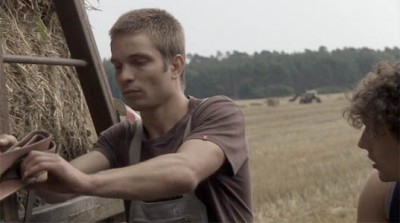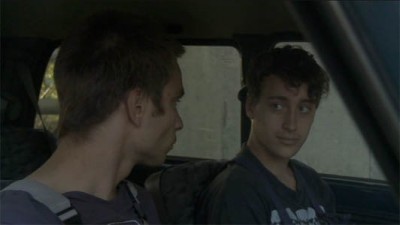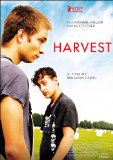| Reviews & Columns |
|
Reviews DVD TV on DVD Blu-ray 4K UHD International DVDs In Theaters Reviews by Studio Video Games Features Collector Series DVDs Easter Egg Database Interviews DVD Talk Radio Feature Articles Columns Anime Talk DVD Savant Horror DVDs The M.O.D. Squad Art House HD Talk Silent DVD
|
DVD Talk Forum |
|
|
| Resources |
|
DVD Price Search Customer Service #'s RCE Info Links |
|
Columns
|
|
|
Harvest
German indie drama Harvest is, to put it politely, deliberately paced. Contemplative, perhaps? Okay, I'll say it - the film is slow.
Slow can be good, however, especially for coming-of-age tales like this one. While TLA Releasing seems to be marketing Harvest as a mildly titillating "farm boys in love" story, the film itself functions more as a quasi-documentary look at contemporary German youth - which just happens to have two gay characters at its center.
The film follows withdrawn young man in his late teens named Marko (played by Lukas Steltner) as he embarks on a program for local youths to earn school credit and working experience helping out on a farm collective. Marko and the other boys and girls in the program are given an orientation by program officials at the farm, where the kids are outfitted to help clean animal stalls, process vegetables and haul things around. We follow Marko as he makes his way around the farm and tentatively gets to know the other students in the program. The kids, who come from families in varied states of disfunction, appear to take well to farm life, although they are puzzled by Marko's standoffish nature.

Marko, who comes from a family with an alcoholic, neglectful father, appears to enjoy the manual labor at the farm. He's edgy and easily distracted, however, and unable to cope with doing the written reports required of him. He is introduced to Jacob (Kai Michael Müller), a new recruit to the program. Marko, Jacob and the other students have a meeting with the program coordinator to discuss their career plans, then they are sent about their assigned tasks - filling a water truck, tagging a newborn baby calf, sorting out washed carrots.
After a while, the self-assured Jacob sees something in Marko, and the two strike up a tentative friendship. They find a few quiet times to converse and go swimming together. The two come across an abandoned car on the farm, sit inside, and talk about their desire to drive somewhere. Jacob then feels emboldened to kiss Marko, but Marko pulls away and becomes aloof toward him the next day. Eventually the two get back together again and embark on that car trip to the city they'd been talking about.
Harvest is a film that's difficult to warm up to, but I found the cinéma-vérité look at this side of German agriculture intriguing and quite appealing for the most part. Director and screenwriter Benjamin Cantu made the film on a tiny budget using people who were already in the farming and student mentoring program in the rural town where it was shot. As the leading pair, Lukas Steltner and Kai Michael Müller made up two of the three professional actors cast in the film. The fact that the film was mostly populated by locals contributes a lot to the film's immediate, documentary-like feel. The un-showy performances of Steltner and Müller also add to the naturalism of the script. Marko and Jacob's story is played out in a realistic manner which likely reflects a lot of what happens with gay youth in rural communities. The film is an effective, if overly sedate, study which only loses track in the scenes shortly after Marko and Jacob's first kiss. Once they arrive in the city, the film takes a not-so-compelling turn focused solely on the guys' relationship (the murky photography doesn't help much, either). The film's conclusion takes us back to the farm, underscoring the importance of setting in this quiet, sweet tale.

The DVD:
Video:
TLA Releasing's DVD edition of Harvest comes with a 1.78 anamorphic widescreen image with a clean transfer. The film was shot digitally using available light, which resulted in several indoor and nighttime scenes having a flat, overly corrected look that detracts from the film's effectiveness.
Audio:
The film's German language soundtrack is supplied in a single, well-balanced Stereo 2.0 track with optional English subtitles. It sounded good, overall. The scoring in this film is kept to a minimum, so that wasn't an issue.
Extras:
Harvest's modest batch of extras mostly revolve around getting to know the film's director. The 7-minute Interview with Director Benjamin Cantu is a casual sit-down, while the 19-minute Philadelphia QFest: Q&A with the Director is a more revealing conversation shot in July 2011 in front of a live audience. Despite obvious sound issues, both featurettes have some interesting tidbits about the making of the film. A trailer is also supplied.
Final Thoughts:
A subtle, snail-paced flick like Harvest might be a tough sell for those who prefer their gay dramas to run hot-blooded and melodramatic. Stick with it, however, and you'll find some sweetly rewarding vignettes of two young men in the process of finding themselves. Recommended.
Matt Hinrichs is a designer, artist, film critic and jack-of-all-trades in Phoenix, Arizona. Since 2000, he has been blogging at Scrubbles.net. 4 Color Cowboy is his repository of Western-kitsch imagery, while other films he's experienced are logged at Letterboxd. He also welcomes friends on Twitter @4colorcowboy.
|
| Popular Reviews |
| Sponsored Links |
|
|
| Sponsored Links |
|
|
| Release List | Reviews | Shop | Newsletter | Forum | DVD Giveaways | Blu-Ray | Advertise |
|
Copyright 2024 DVDTalk.com All Rights Reserved. Legal Info, Privacy Policy, Terms of Use,
Manage Preferences,
Your Privacy Choices | |||||||













